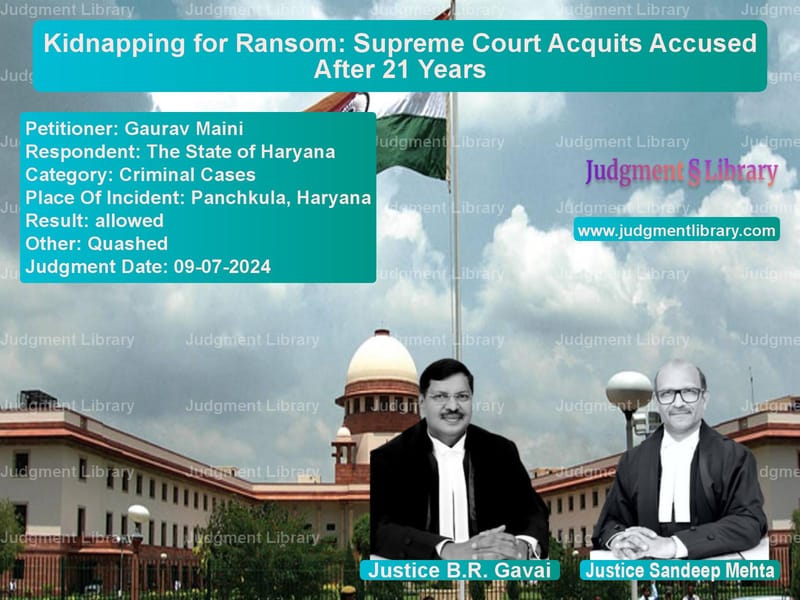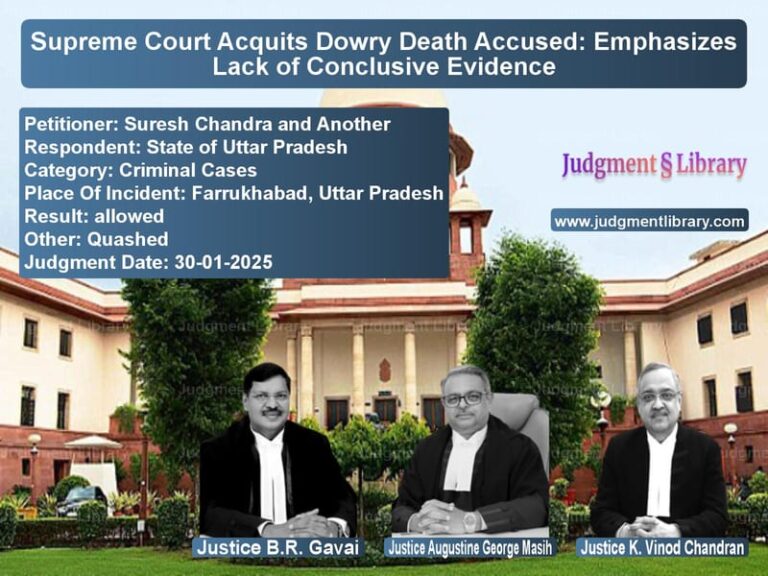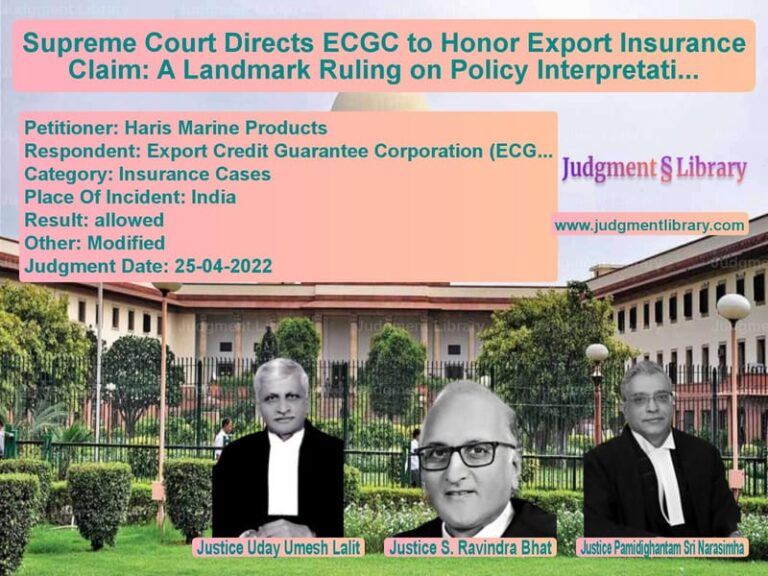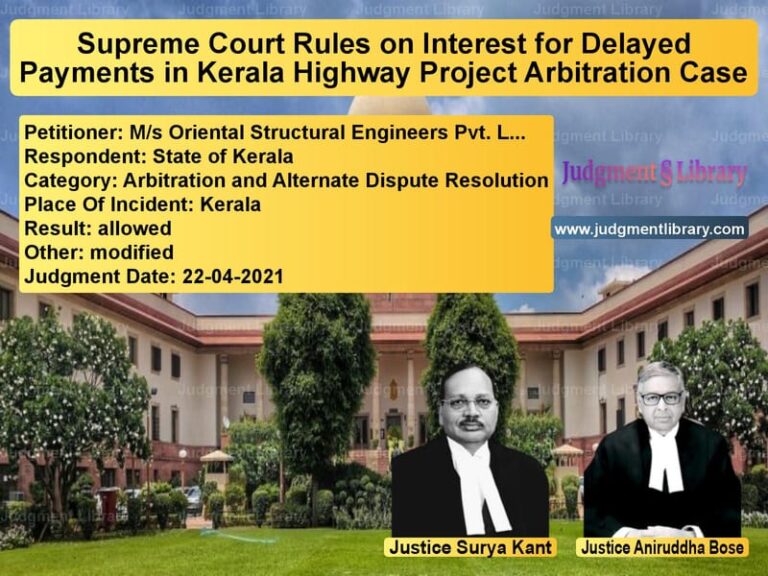Kidnapping for Ransom: Supreme Court Acquits Accused After 21 Years
The Supreme Court of India recently delivered a landmark judgment in Gaurav Maini vs. The State of Haryana, overturning the conviction of four accused individuals in a high-profile kidnapping-for-ransom case in Panchkula. The Court found serious lapses in the investigation, including fabricated evidence, failure to follow legal procedures, and the suppression of crucial witnesses. As a result, the accused, who had been sentenced to life imprisonment, were acquitted after spending nearly two decades fighting for justice.
Background of the Case
On April 2, 2003, Sachin Garg, a young boy, was allegedly kidnapped while returning from playing badminton in Panchkula, Haryana. According to the prosecution, the kidnappers demanded a ransom of Rs. 1 crore from his father, Mahesh Garg. The family allegedly arranged the ransom and delivered it, leading to Sachin’s release the next day. However, the family did not report the incident to the police immediately. Instead, the police claim to have received a ‘secret tip-off’ on April 15, 2003, about a gang operating in Panchkula that was kidnapping children for ransom.
Following an investigation, the police arrested four individuals: Gaurav Maini, Gaurav Bhalla, Munish Bhalla, and Sanjay @ Sanju. The accused were charged under Sections 364A (kidnapping for ransom), 392 (robbery), and 120B (criminal conspiracy) of the Indian Penal Code (IPC). The trial court convicted them in 2005, sentencing them to life imprisonment. Their appeals were rejected by the Punjab and Haryana High Court in 2009. The case then reached the Supreme Court.
Key Legal Issues Considered
- Was the prosecution’s case credible, given the delay in reporting the crime?
- Was the investigation conducted in accordance with legal standards?
- Were the accused properly identified and linked to the crime?
- Was there sufficient evidence to sustain the convictions?
Arguments by the Appellants (Accused)
- The entire case was fabricated to falsely implicate them.
- The complainant’s family never reported the kidnapping, which was highly suspicious.
- The police did not conduct a proper Test Identification Parade (TIP) for the accused.
- The alleged ransom money recovered from the accused was never produced in court.
- There was no direct evidence linking them to the ransom calls.
Arguments by the Respondents (State of Haryana)
- The victim, Sachin Garg, had identified the accused in court.
- The accused had used specific mobile numbers to demand ransom.
- The police had recovered a portion of the ransom money from the accused.
- The delay in reporting the crime was due to fear instilled by the kidnappers.
Supreme Court’s Findings
- The family’s failure to report the kidnapping was highly suspicious.
- The police relied on a vague ‘secret tip-off’ rather than an official complaint.
- The accused were not subjected to a Test Identification Parade.
- The prosecution failed to prove that the accused were using the mobile numbers involved in the ransom calls.
- The alleged recovered ransom money was never produced in court.
The Court ruled:
“The entire prosecution story is nothing but a piece of fabrication… The accused were framed in the case for ulterior motives.”
Key Directives Issued by the Court
- The convictions of all four accused were set aside.
- They were ordered to be released immediately if not required in any other case.
- The police were criticized for failing to conduct a fair investigation.
Impact of the Judgment
- Precedent for Fair Trials: The ruling reinforces that wrongful convictions must be rectified.
- Importance of Proper Investigation: The judgment highlights the need for fair and lawful police procedures.
- Judicial Oversight: The case serves as a warning against arbitrary arrests and flawed prosecutions.
Conclusion
The Supreme Court’s decision in this case underscores the importance of due process and fair trials. By acquitting the accused due to unreliable evidence and procedural lapses, the Court has reaffirmed its commitment to justice. The case also serves as a reminder of the devastating consequences of wrongful convictions and the necessity for thorough and transparent investigations.
Petitioner Name: Gaurav Maini.Respondent Name: The State of Haryana.Judgment By: Justice B.R. Gavai, Justice Sandeep Mehta.Place Of Incident: Panchkula, Haryana.Judgment Date: 09-07-2024.
Don’t miss out on the full details! Download the complete judgment in PDF format below and gain valuable insights instantly!
Download Judgment: gaurav-maini-vs-the-state-of-haryana-supreme-court-of-india-judgment-dated-09-07-2024.pdf
Directly Download Judgment: Directly download this Judgment
See all petitions in Bail and Anticipatory Bail
See all petitions in Fraud and Forgery
See all petitions in Custodial Deaths and Police Misconduct
See all petitions in Judgment by B R Gavai
See all petitions in Judgment by Sandeep Mehta
See all petitions in allowed
See all petitions in Quashed
See all petitions in supreme court of India judgments July 2024
See all petitions in 2024 judgments
See all posts in Criminal Cases Category
See all allowed petitions in Criminal Cases Category
See all Dismissed petitions in Criminal Cases Category
See all partially allowed petitions in Criminal Cases Category







